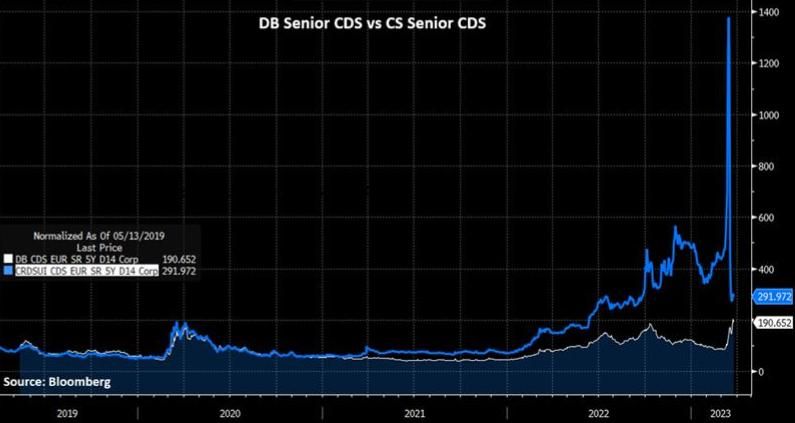Will Deutsche Bank be the next domino to fall?
That is the question on investors’ minds following the plunge in Deutsche Bank’s share price and the record spike in credit default swaps late last week. Will Deutsche Bank be the next domino to fall after the collapse of Credit Suisse?
We think not, as Deutsche Bank and Credit Suisse are very different beasts. We focus on two key points:
Liquidity – “flighty” vs “sticky’ deposits.
Credit Suisse’s deposit base comprised largely of money from high-net-worth clients which meant a significant part of the deposit base was uninsured (the Swiss deposit insurance scheme runs up to CHF 100,000). This saw Credit Suisse’s deposits base to deplete by 40% in a quarter with outflows accelerating prior to the UBS takeover.
In contrast, Deutsche Bank’s deposit base is a lot “stickier” with around 50% from retail and 47% from corporate clients. Of the retail deposits, 76% are protected by deposit insurance and of the commercial deposits, around 87% are considered operational deposits and hence sticky. These are deposits pledged with Deutsche Bank to secure FX, and working capital lines of credit from large German multi-nationals – think Volkswagen, BMW, Siemens…
Profitability – Credit Suisse net loss vs Deutsche Bank net profit
In 2022, Credit Suisse posted a net loss of CHF7.3 billion, its largest loss since the GFC. The Swiss bank was embroiled in major scandals such as the likes of Archegos and Greensill, and had made significant write-offs as part of its major strategy revamp. Credit Suisse failed to halt large deposit outflows which led to question marks being placed around its turnaround strategy and marked Credit Suisse’s business model as non-viable going forward, even with the Swiss National Bank liquidity backstop.
Deutsche Bank on the other hand posted a net profit of EUR 5.5 billion in 2022, its third straight year of profits. To us, this demonstrates the German banks successful multi-year strategy overhaul and restructuring.
All-in-all the difference in liquidity and profitability give us comfort that a deposit run for Deutsche Bank is unlikely. We also note that Deutsche Bank CDS has historically been a proxy for European banks under stress and highlight that while it spiked to historical levels, it remains materially lower than Credit Suisse during the 2nd half of 2022.

Realm is your partner
Our clients are our lifeblood. With deep experience investing in Australian credit and fixed income markets, Realm is results-oriented in being always focused on delivering client outcomes.
Please follow me for more global credit markets commentary.
2 topics

